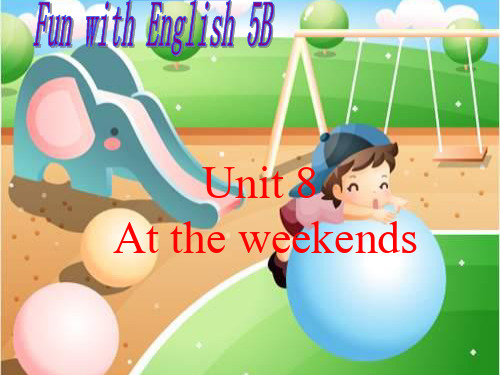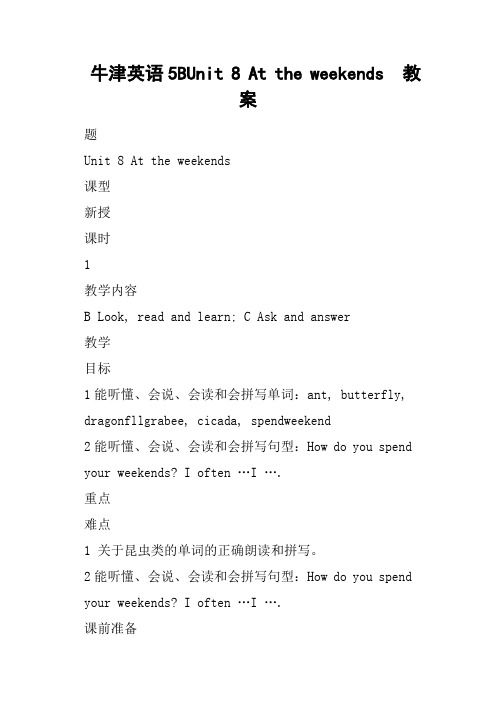江苏牛津英语5BUnit 8 At the weekends
(江苏省获奖教案)牛津小学英语5BUnit8Attheweekends教案

(江苏省获奖教案)牛津小学英语5B Unit8 At the weeke nds教案牛津小学英语5B Unit8 At the weekends教案[教案分析]本单元的内容是牛津小学英语5B 的U n it8 ,这个单元的核心内容是"周末活动"。
涉及的句型有:Howdoyouspendyourweekends?Howdoeshe/shespendhis/herweekends? 这些和Unit4 的句型Whatdoeshe/sheusuallydoonSundays?He/Sheusually 有一定联•系。
让多动”学生在真实的情境中收获语言知识,获得学习的兴趣与信心。
[教学课题]牛津小学英语5BUnit8Attheweekends[教学目标]1. 知识目标(1 )、四会掌握词组:attheweekends ,learnfrom 三会词组catchbutterflies(2 )、四会掌握句型:Howdoyouspe ndyourweeke nds?lofte n •…SometimesI •…Howdoeshespendhisweekends?Heoften …Sometimeshe …Howdoesshependsherweekends?Sheoften …Sometimesshe …2. 技能目标:通过小记者访问,书信交流,谈论家人爱好等活动,让学生灵活运用今天所学的英语句型,提升英语的综合运用能力3. 情感目标:通过活动、游戏使学生产生学习英语的兴趣;敢于、乐于、善于开口讲英语,积极参与交流,树立学好英语的信心。
4. 教学重点、难点(1)教学重点学生能听说读写单词词组weekends,attheweekends 能运用Howdoyouspendyourweekends?Howdoeshe/shespendhis/herweekends? 进行交际。
(2)教学难点动词第三人称单数形式的运用。
牛津5BUnit8AttheweekendsTh

Su Hai SuYang
go to the park
do housework
a
sometimes go swimming
catch butterflies play basketball listen to music go to the cinema
12
Task 3 Learn a new phrase
How do the children spend their weekends?
a
14
How does Mike spend his weekends?
Mike often goes climbing.
Sometimes, he listens to the music. Sometimes he goes to the cinema.
a
6
learn learn …from…
从/向……学到
a
7
Dear Mr. Lu There are 4 tasks in my e-mail, Can you and your friends do ?
Task 1 Task 2 Task 3 Task 4
a
8
Task 1 Watch the cartoon and answer the questions.
a
19
I think your English is very good. You can succeed.(成 功)
Yours
Jack
a
20
Dear friends:
I’m your new friend, Mike. I’m an English boy. I live in Nanjing now. I like _s_p_o_rt . At the weekends, I often g_o__cl_im__b_in_g.Sometimes I _lis_t_e_n to music or _g_o__ _to__ the cinema.
牛津苏教版-英语-五下-5B Unit 8 At the weekends 教学方案设计

在自主查找资料的过程中渗透社会文化知识。通过说和写,进一步巩固新知。
反思
1. (1) Read the E-mail.
(2) Ask and answer in groups then in class.
2. Write the E-mail.
通过阅读了解外国家庭的周末生活,并尝试结合自己家庭的实际情况进行描述。
Assignment
Give homework.
1. Complete the composition.
While-task procedure
(20’)
1. Ask the sts what they can do at the weekends.
2. (1) Ask the sts to open the book and listen to the recorder.
(2). Ask: What do they do at the weekends? Let the students to fill in the blanks.
3. Teach the sentence:
How do you spend your weekends?
How does …spend his/her weekends?
1. Answer in individuals.
2.(1) Look and listen.
(2) Answer the questions.
(Write down the verb phrases from the students’ answers.)
1.Sing a song together.
牛津英语5BUnit 8 At the weekends 教案

牛津英语5BUnit 8 At the weekends 教案题Unit 8 At the weekends课型新授课时1教学内容B Look, read and learn;C Ask and answer教学目标1能听懂、会说、会读和会拼写单词:ant, butterfly, dragonfllgrabee, cicada, spendweekend2能听懂、会说、会读和会拼写句型:How do you spend your weekends? I often …I ….重点难点1 关于昆虫类的单词的正确朗读和拼写。
2能听懂、会说、会读和会拼写句型:How do you spend your weekends? I often …I ….课前准备教具准备:各种昆虫图片,单词卡片,录音机和磁带师生互动教学过程教学环节教师活动学生活动AFree talk1 Who’s on duty today?Do you have any hobbies?2 Do you like …?What do you usually do on Saturdays/Sundays?I aI do. I like ….Yes, I do.No, I don’t.I usually ….BPresentation and pra出示图片: Look aures.There are maLan ant. Do you like it?Teach:ant同法学习单词:butterfly, dragonflly, grabee2 放录音3 Play a game.展示图片的一个角,让学生猜猜是什么昆虫。
跟读,齐读。
跟读并拼读。
跟读并拼读。
听录音,模仿读。
CAsk and answer1 How do you spend your weekends?Teach: spend weekends2 (教学生回答)I often ….Teach:逐一出示图片,让学生操练句型Teach: caDo a survey:调查班机学生在周末都干些什么。
牛津英语5B Unit 8 At the weekends测试题及答案

Unit 8 At the weekends一、词组互译1.缺席2.after lunch3.在星期一4.in a week5.新学期6.take some medicine7.第二节课8.at once9.在学校10.get a bad cough11.在周末12.talk about13.去游泳14.surf the Internet15.打篮球16.learn…from17.听音乐18.wash clothes19.捉昆虫20.watch cartoons二、词型转换1.like (第三人称单数) 2.class(复数)3.take(现在分词) 4.let us(缩写形式)5.right(同音词) 6.have(现在分词)7.touch(第三人称单数) 8.left(反义词)9.your(主格) 10.eye(同音词)11.do(第三人称单数) 12.run (现在分词)13.swim(现在分词) 14.butterfly(复数)三、用所给词的正确形式填空1.He has ___________ a headache. ( get )2.Gao Shan likes (make) model ships.3.____________ are over. ( class )4.This is Lin Tao _____________. ( speak )5.What subject ___________ she ___________? ( like )6.I like ____________ stamps. (collect)7.My father ___________ the Internet at five o’clock every afternoon. (surf) 8.Please show ____________ your coins. ( we )9.Can you get a glass water for (I)?10.She often (study) English in the morning.四、选择题( ) 1. There no time to wash.A. amB. isC. are( ) 2. A: ?B: It’s t en thirty.A. Wh at’s thatB. When is itC. What’s the time ( ) 3. time go to school.A. It’s, forB. It’s, /C. It’s, to( )4. Jump up down .A. with, ten timesB. and, ten timeC. and, ten times ( ) 5. A: Are you ready dinner? B: Yes.A. onB. toC. for( ) 6. How Mike and Helen spend weekends?A. does, theirB. do, hisC. do, their ( ) 7. A: Does Su Yang watch TV at night? B: Yes, she TV at night.A. watchB. watchesC. watchs ( ) 8. The students can learn a lot the books.A. aboutB. toC. from( ) 9. I like , but I like better.A. climbing, dancingB. climb, danceC. climbs, daces ( ) 10. A: What is your father doing? B: He is talking an old man.A. atB. toC. in五、根据要求写句子1.It’s Sunday. (对画线部分提问)________________________________________________2.I like English. (对画线部分提问)________________________________________________3.We have eight subjects this term. (对画线部分提问)________________________________________________4.I like watching TV at home. (否定句)________________________________________________5.She often goes to the park on Sundays. (对划线部分提问)________________________________________________6.My grand father usually reads magazines at the weekends. (对划线部分提问) 7.My sister often catches insects in the park. (改为否定句)8.There are some butterflies in the bottle. (改为一般疑问句并作肯定回答)9.I listen to music or go to the cinema. (改为一般疑问句)10.My brother likes reading books. (否定句)六、连词成句并翻译成中文1.you, spend, weekend, how, your, do2.weekend, Miss Li, does, how, spend, her3.friends, our, insects, good, are4.about, you, how5.too, she, cartoons, often, watches七、阅读理解Jim’s FamilyIt’s nine o’clock in the evening. The family are at home. Jim’s father is sitting in a chair. He’s watching TV. His mother is standing near the window. She’s giving some food( 喂食) to the bird, Polly. Polly says, “Thanks! Thanks!” Where’s Jim? Oh, he’s behind the door. Kate is looking for him. They are playing games. There is no homework on Sunday evening.根据短文选择正确的答案。
5B Unit8 《At the weekends》

英语教学中的互联网搜索牛津小学英语5B Unit8 《At the weekends》教学设计江苏省泰州市泰兴市城东实验学校戴晶一、教学内容:牛津小学英语5B Unit8《At the weekends》Part B、C二、教材简析:本单元教学内容主要围绕“周末活动”这一主题展开,通过周末活动引出本单元的四会内容,涉及的句型有How do you spend your weekends ? I often …Sometimes I ……. How does she/he spend his/her weekends ? He/She often …Sometimes he/she … 。
周末活动这一教学内容,学生非常感兴趣,所以教学中教师可以创设比较生动的情景,以便更有效地帮助学生复习有关动作类的词组,将教学内容与实际生活紧密联系起来,而动词词组的第三人称单数形式是本单元教学的中难点所在,教师可以设计丰富多彩的教学活动来帮助学生复习理解。
三、教学目标:1、能正确地听、说、读、写昆虫类单词:ant、butterfly、dragonfly、firefly、bee、grasshopper2、能正确地听、说、读、写句型:How do you spend your weekends? I often ….3、情感目标:Insects are our good friends四、教学重点:1、能正确地听、说、读、写昆虫类单词2、能正确地听、说、读、写句型:How do you spend your weekends? I often ….五、教学难点:单词读音的准确性,以及句型的掌握六、教具准备多媒体动作照片、多媒体公园昆虫动画,单词卡片,对话图片七、教学过程:Step1 Warm-upHello,boys and girls!First let's do some exercise,are you ready?(do some exercise:jump ,run,walk …)Step2 Presentation1)引出单词 weekend 、weekendsT: What day is it today?S: It’s ….T:There’re seven days in a week. Can you tell me what are they? S:They’re Monday, Tuesday …T: Yes, we know there are seven days in a week. In China, Saturday and Sunday are the end of a week .So we also call them weekend . on Saturdays or Sundays means weekends. 由学生熟悉的Saturday和 Sunday引出weekend 一词,有利于学生对这一单词的理解。
牛津苏教版-英语-五下-5B Unit 8 At the weekends 教案(5课时)

Unit 8 At the weekendsLesson1第一课时教案内容:一、教学内容:5B .Unit 8 A部分Read and Say二、教学目标:1 能正确理解、掌握A部分会话,并能朗读、初步表演对话。
2 能正确地运用对话中出现的日常交际用语。
3 初步掌握会话中出现的四会单词和句型。
三、教学重、难点:能正确理解、掌握A部分会话。
四、课前准备:1 准备本课会话的投影片。
2准备录音机和磁带。
3黑板上预先写好课题Unit 8 At the weekends五、教学过程:A Listen to a song 听歌曲We know.B Free talk 师生交流C Revision 复习1 出示图片,让学生看图复习以前所学的词汇---go swimming/ climbing/ jogging, play football/ basketball, play the piano/ violin, go to the park/ cinema, watch TV, play chess ...2 活动:听听、说说、做做。
学生听教师口令边说、边做动作,巩固以前所学的词汇。
D Presentation and drill 新授和操练1 教师出示一个挂历,指着星期六和星期天问学生What do you do on Saturdays and Sundays? 学生回答I play football. 教师接着说:How do you spend your weekends? Oh, you often play football at the weekends.让学生理解句子的意思,然后教师指着星期六和星期天对学生说weekend, at the weekends, 让学生理解该词的含义,跟读模仿单词weekend, at the weekends 及句型How do you spend your weekends? 板书单词及句型weekend 及句型How do you spend your weekends?2 教师在挂历的大部分周末处画上足球,剩下的画上TV---T : How do you spend your weekends? 启发学生回答: I often play football. Sometimes I watch TV. 通过直观的图示使学生了解often 和sometimes 的含义,板书单词often 和sometimes 及句型I often play football. Sometimes I watch TV.3 师生问答,学习并操练How do you spend your weekends?及其答语I often ... Sometimes I ...4 教师出示课文投影片简介课文内容,让学生了解对话的背景,然后问学生:Look. This is Wang Bing. How does he spend his weekends? He likes surfing the Internet.通过画有电脑的投影片使学生明白该句的意思。
牛津苏教版-英语-五下-5B Unit 8 At the weekends复习大纲

5B Unit 8 At the weekends复习大纲要求掌握的单词:蚂蚁ant 蝴蝶butterfly 蜻蜓dragonfly 萤火虫firefly 蟋蟀cricket 蚱蜢grasshopper 蜜蜂bee 蝉cicada谈论,讲话talk 周末weekend 很,非常very 体育运动sport 经常often(同义词)usually 抓住,捉住catch 勇敢的brave 打架fight 发光glow要求掌握的词组:1、星期五下午Friday afternoon2、谈论他们的周末talk about their weekends3、度周末spend one’s weekend4、每个星期六和星期日every Saturday and Sunday5、在周末at the weekend6、看动画片watch cartoons7、捉昆虫catch insects8、当然of course9、我们的好朋友our good friends10、搬大的东西carry big things11、在夜晚at night12、在大热天on hot days13、去爬山go climbing14、去游泳go swimming15、在秋千上玩play on the swings16、打扫房间clean the rooms要求掌握的句型:四、下课了。
Class is over. / Classes are over.五、放学了。
School is over.3.课后after class 放学后after school4.I can learn a lot from it. 我可以从中学到好多。
5.How do you spend your weekends? I often…./ Sometimes I …你怎样度你的周末呢?我经常…/有时我…6.How does ….spend his / her weekends?He/ She often… / Sometimes he/ she……怎样度他/她的周末呢?他/她经常… / 有时他/他…例:How do you spend your weekends?I often watch cartoons. / Sometimes I watch cartoons.How does David spend his weekends?He often watches cartoons. / Sometimes he watches cartoons.How does Nancy spend her weekends?She often watches cartoons. / Sometimes she watches cartoons.I study at Yu Cai School. 我在育才学校学习。
- 1、下载文档前请自行甄别文档内容的完整性,平台不提供额外的编辑、内容补充、找答案等附加服务。
- 2、"仅部分预览"的文档,不可在线预览部分如存在完整性等问题,可反馈申请退款(可完整预览的文档不适用该条件!)。
- 3、如文档侵犯您的权益,请联系客服反馈,我们会尽快为您处理(人工客服工作时间:9:00-18:30)。
江苏牛津英语5B“Unit 8 At the weekends” Part E, F, G, H 教学案例分析苏州市吴中区木渎实验小学沈燕琴Teaching aims1.Aims on the knowledge:A.By the end of this lesson the students should be able to understand, say, read the passage.B.To know the pronunciation [I:] and try to sing the song.C.To review the key sentences “How does …spend hid/her weekends? He/She often…Sometimes he/she…”2.Aims on the abilities: To develop Ss’ abilities of listening, speaking, reading and writing.3.Aims on the emotion:A.To develop Ss’ sense of co-operation.B.Let Ss know some of insects are our good friends. We should protect them.Important points and difficult points1.To help the Ss understand the passage and read the passage correctly.2.To develop the Ss’ interest in English.Teaching Aids: CAI, some butterflies’ pictures, some printed form.Teaching procedure:Step 1. Warm-up and revision1.Sing some songs and say some rhymes2.Free talk(简析:通过唱唱说说,活跃学生身心,融洽学习氛围。
通过师生的交流,复习以前的语言知识,如: Do you have any hobbies? What do you like? What do you usually do at the weekends? How do you spend your weekends?等等,从师生间的自然交流引入本单元所学的重点语言知识How do you spend your weekends?的复习,同时也自然过度到下一环节,引出本课主题内容。
)Step 2 Presentation and practice1.Part FA.Story time. Enjoy a cartoon. How do Mimi and Bobby spend their weekends? Catch insects.B.Guess the riddles.It likes flowers. It can dance in the flowers. What is it? It’s a butterfly.It has long legs. It can jump high. What is it? It’s a grasshopper.It looks like planes. It can fly high. What is it? It’s a dragonfly.It is very small. It can carry big things. What is it? It’s an ant.It is very special. It can glow at night. What is it? It’s a firefly.It is very busy. It can make sweet honey. What is it? It’s a bee.Introduce the phrases in the rhyme. Help Ss understand “carry big things, special, glow at night”.C.Chant: Say the rhyme.(简析:本部分通过欣赏动画,引出本课主题“catch insects”,给学生一个直观的感受,同时也激发学生的学习热情。
通过猜猜谜语,复习本单元出现的昆虫单词,同时解决下面passage中出现的几个重点短语““carry big things, special, glow at night”,在帮助学生理解时可以用动作演示carry,实物演示glow,几种昆虫比较理解special,教师可以通过旧单词来引出新单词的读音,帮助学生记忆,如:can, hurry----carry;spend, social----special;grow---glow,区别字母r,l的发音。
最后,通过chant,将六种昆虫的特征说出,做一个总结,同时也活跃一下课堂气氛。
)2.Part HA.Present the song by CAI. “How many insects can you see? What other interesting insectdo you know?”B.To know cricket by picture. “cricket”, “like to fight”.C. Listen and follow to sing.D. Choose the best answer.A cricket ______________A bee __________________An ant _________________A butterfly_______________(简析:通过卡通动画展示歌曲,让学生在欣赏歌曲中动脑思考,复习了已学的三种昆虫,再引出其他昆虫cricket的学习。
既给学生一个拓展学习,又解决了Part E部分的短语other interesting insects的理解。
为了给学生更多的思考和发展空间,在学生跟唱稍熟后,设计了一个替换唱练习,对学生的唱不做很高要求,只要把所给框中的内容正确选入就行,教师可以帮助学生唱出。
这替换唱既是拓展学生的能力,又能在选择填空这样一个练习中检查学生刚才学过的知识。
可谓一举两得。
)3.Part GA.Present the picture of Part G. “What insect can you see?What are they doing in the tree?”“I can see some bees sleeping in the tree.”“see, bee, sleep, tree” Let Ss listen and find the same pronunciation [I:].B. Read some old words and sentences.C. Try to read the new words and sentences.(简析:本部分的语音内容也紧密结合本课主题insects,所以还是从昆虫引入。
通过展示图片,思考两个问题,听读单词,找出四个单词的共同音。
为了训练学生的朗读能力,给学生试读一些学过的相关的单词、句子,如need, We n ee d to clean the library. meet, Glad to m ee t you. sweep, She sw ee ps the floor every day. sweet, I like eating sw ee ts. week, We have thr ee English lessons every w ee k. teeth, Please brush your t ee th every day.feet, Put your f ee t together, please.’.和没有学过的单词、句子,如:Beetle: Mr. Li often catches beetles at the weekends. 强化字母ee组合的读音[i:],在这样的训练中,学生的读词水平能得到很好提高,单词的发音规律也能在摸索朗读中得到很好的总结。
)Part E.A.Present a picture of a boy. Introduce Passage 1. Ask Ss to listen to the recorder andanswer the question “How does he spend his weekends?”B.Listen to Passage 2 and then answer. “What’s in the park?”“What are they?”(评析:本部分是一篇小短文,我将他分成两小段教学。
从上一部分语音教学读句子中的Mr. Li often catches insects. He likes insects very much. 引入我的朋友Tim也很喜欢insects,同时展示他的图片,学习他的所在学校名称,再让学生结合自己的学校说出I study at … Primary School. 为了训练学生的听力,我在两小段展示前都先让学生带着问题去听,如第1段让学生边听边思考How does he spend his weekends?第2段边听边思考What’s in the park? What are they? 学生听的注意力将更集中,听的效果也得到更好的体现。
在初步听短文,总体感知后,学生大体听懂并回答出老师的问题。
为了进一步深化学习,第1段采用了口头替换表达,老师示范,学生模仿介绍自己。
如:I’m a teacher. I work at …Primary School. I like sports very much. At the weekends, I often go climbing. 第2段采用了自读课文,填写表格的形式。
通过学生自己的阅读学习,深化理解,并完成表格。
教师通过与学生的交流展示表格填写的内容,同时教师还可以引导学生朗读表格,如: Ants are small, but they can carry big things. …学生通过朗读表格对第2段讲述的几种昆虫的描述了解的更透彻,对出现的几个重点单词和短语有了更扎实的巩固。
